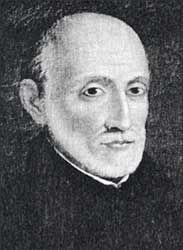Claudius Aquaviva General # 5
General from 1581 to 1615

This Jesuit was the Spanish Armada general and the hit man for Philip II. 6 Popes were given the poison cup during his reign: Sixtus V (1585-90), Pope Urban VII (1590), Gregory XIV 1590-91), Innocent IX (1591), Clement VIII 1592-1605) and Leo XI (1605). Pope Paul V (1605-21), barely survived him and that was because of the death of Philip II.
Claudio was born in Naples the youngest son of Giovanni Antonio Donato d'Aragona, the Duke of Atri in the year 1543. He studied Jurisprudence in Perugia planning a promising career in the Papal service. When he finished his studies Pope Pius IV appointed him a Papal Chamberlain, but Claudio decided to enter the Society of Jesus with which he had become acquainted through his friendship with Francis Borgia and Juan de Polanco. He was 24 years old when he entered the Society in 1567.
After
his Novitiate and a short period teaching Philosophy he became the Rector,
then the Superior, at Naples, stepping next into the office of Provincial
of Naples and the Provincial of Rome.
When the 4th General Congregation was called for February 7, 1581 after
the death of Mercurian, Aquaviva was elected unanimously by the 57 votes
of all the delegates. He was only 37 years old and had been in the Society
only 14 years.
During his 33 years and 11 months as General there is understandably a long list of his accomplishments and interests. The size of the Society had tripled from 5,000 to 13,000, schools from 124 to 372 and Provinces from 21 to 32. It was during his generalate that the famous Jesuit Missions in Paraguay were set up. He actively promoted the Missions in Japan, England, Germany, France, Flanders, and Spain. He was very cognizant of the cultural problems the Jesuit missionaries faced in distant mission lands. He encouraged the setting up of Sodalities for students and alumni of Jesuit Colleges and he tried to moderate the upheaval brought on by the theories of Galileo. He offered to Gregory XIII many of the most competent Jesuit scientists to set up the new dating of the Calendar on October 15, 1582 and entrusted the task to the most eminent of all, Christopher Clavius, the most distinguished mathematician of the time. He had appointed Robert Bellarmine Rector of the Roman College and was present when the Church of the Gesú was finally finished and was also present at its consecration in 1583. It was he who approved the entrance of Aloysius Gonzaga into the Society on November 25, 1585.
After these many accomplishments and long years of governance of the Society, he died at the age of 62 on January 31, 1615. At first he was buried in the Church of St. Ignatius, but was later transferred to the Ossuary in the crypt of the Gesú.